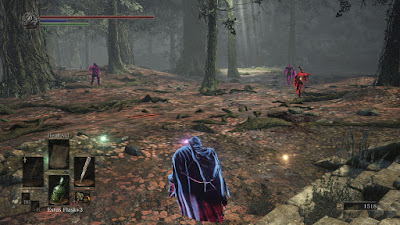It's technically not an official part of the game. It's an outgrowing of the organic multiplayer they have built-in, where it's primarily the players who decide how or even whether they encounter each other in the course of play. Other players are generally meant to be antagonists – they "invade", appearing randomly in your game with the goal of killing you and setting your progress back for a reward.
However, other players can also be intentionally summoned in certain circumstances, to help or to hinder. One custom that developed was for a "host" player to summon many invading spirits at once, and sometimes, if the conditions are right, rather than the invading spirits piling on and killing the host, for a variety of reasons, the invaders might just decide to fight each other.
For the host's amusement, for sport, for fun, or to practice, these transitory groups – which completely lack any means of communication other than vague gestures such as pointing or waving – end up being some of the most interesting online interactions that I've ever had. I had not known about fight clubs when starting out with Dark Souls 2, and yet I instinctually understood what was happening when I was first summoned as an invader and saw a pack of players all grouped around two combatants, watching them duke it out.
Enter the ring and face the possibility of losing, and being sent back to your world. It's refinement through failure, repetition. It's the mantra of "git gud" (get good), as Dark Souls slang phrases it. But more than that, it's a way to develop an identity, and status. Apart from streaming, fight clubs are one of the only ways to actually have your normally solitary player-vs-player conflicts observed by other players. In addition, somehow the lack of text or voice communication options actually elevates this process, forcing you to interpret for yourself what others think of your skills and your style based only off of their movements and the gestures they perform.
Dark Souls has a lot to offer – it's basically a punishing Zelda game wrapped in the gothic aesthetic of Diablo 1 & 2. Yet, despite the massive, beautiful, and dangerous world, what keeps me coming back to the game is the potential of these fleeting and strange encounters with other players -- players who will likely never meet me or each other again, who will never know each others' names, and who yet develop their own customs and etiquette and tricks based on this world and its rules.
Other than Dark Souls 2 & more recently Dark Souls 3, I've also been playing some games in a similar vein. One of the major entries is For Honor, which I posted about previously. I'm also eagerly anticipating a game called Absolver (beta starting soon), which seems to share a lot more with Dark Souls in terms of encouraging emergent player customs and interaction.
What these games have in common is that they rely heavily on precise timing and have a strong emphasis on physical momentum and melee combat. They also leave a lot of room for bluffing, counter-moves, and reading opponents in player-vs-player combat. They are great to play with a gamepad, and offer an extremely deep combat experience with a lot to learn and master. And, most importantly, they give you a lot of room to develop your own style, to express your personal way of playing, and to participate in an identity exchange, of sorts, with the players you meet.






I don't want to spoil anything, but Journey (PS3/4) has some of the same mechanics in a really interesting way.
ReplyDeleteI hear that one referenced a lot. Sounds like a really interesting game. I wonder if they'll give it a PC port eventually...
Delete